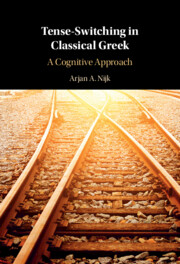4 results
7 - Present Tense
- from Part IV - Locating and Inferring
-
-
- Book:
- Linguistics Meets Philosophy
- Published online:
- 06 October 2022
- Print publication:
- 13 October 2022, pp 217-242
-
- Chapter
- Export citation
Introduction
-
- Book:
- Tense-Switching in Classical Greek
- Published online:
- 27 January 2022
- Print publication:
- 17 February 2022, pp 1-30
-
- Chapter
-
- You have access
- Open access
- HTML
- Export citation
Chapter 1 - General Conceptual Model
-
- Book:
- Tense-Switching in Classical Greek
- Published online:
- 27 January 2022
- Print publication:
- 17 February 2022, pp 31-65
-
- Chapter
-
- You have access
- Open access
- HTML
- Export citation

Tense-Switching in Classical Greek
- A Cognitive Approach
-
- Published online:
- 27 January 2022
- Print publication:
- 17 February 2022
-
- Book
-
- You have access
- Open access
- Export citation

